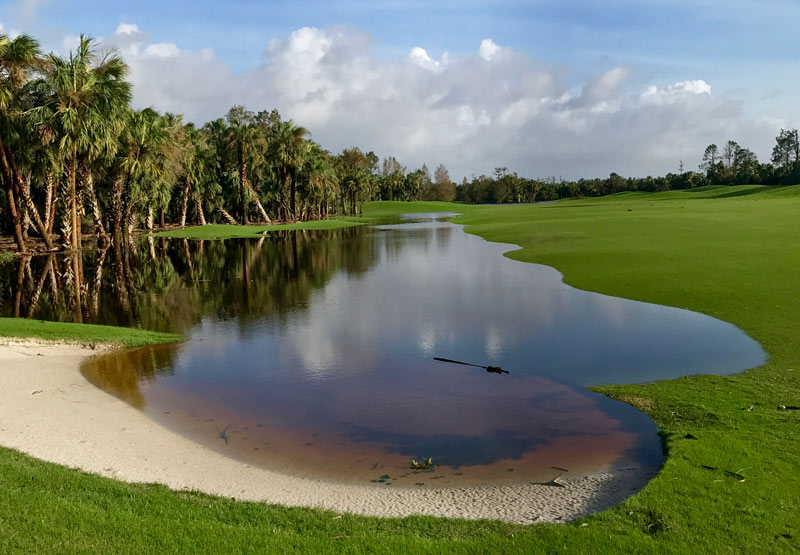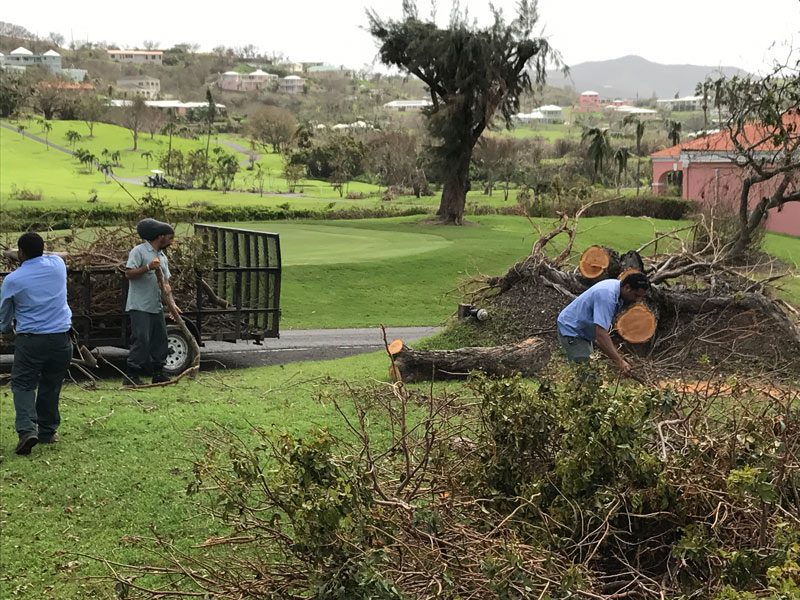
It took several days for the floodwaters left behind by Hurricane Irma to recede at Olde Florida GC in Naples, Fla. Photo courtesy of Darren Davis
Alberto Quevedo, CGCS, encountered devastation everywhere he looked.
As director of golf course maintenance at Hideout Golf Club in Naples, Fla., Quevedo witnessed a sea of trees that had been toppled throughout the course. More than 600, he says. Debris littered Hideout — a common theme among golf courses from Texas to Puerto Rico to Florida and places in between during a blitz of hurricanes in recent months named Harvey (in Texas), Irma (in places such as Florida and the U.S. Virgin Islands) and Maria, which pummeled Puerto Rico and the U.S. Virgin Islands.
Yet one of the lasting images that sticks with Quevedo, a 20-year association member, is the look on the faces of those who work for him.
"I had employees who had tears in their eyes," he says.
Quevedo understood. He also understood that a job needed to be done. His message to his staff was clear.
"It's time to make this place better than it was before," says Quevedo, who is proud of the teamwork his staff displayed, from assistants Juana Diaz (a one-year GCSAA member) and Nick Cristaldi (a three-year association member), to administrative assistant Leisy Abreu, who secured bread and lunch meat for staff sandwiches.
Obviously, when it's go time, superintendents find ways to get going.
Renovation, take two
"We'll make it. We always do," says Bryan Cannan, CGCS, who oversees Worthington Country Club in Bonita Springs, Fla.
Worthington was undergoing renovations when the hurricane pounded the club in September. Work had been in progress for a while, including a new irrigation system that was being installed, new greens, and new bunkers. About half of the course had been grassed when the hurricane arrived. What was scheduled to be completed by late August now hopefully will be done by late November or early December because of the hurricane disruption.
"The whole summer has been a disaster," says Cannan, a 23-year GCSAA member, adding that through Oct. 10, the course had been inundated by 84 inches of rain this year, far above annual norms. "You just have to take each day at a time, complete a small project, and go on to the next one."
The hurricane experience was unlike anything Cannan has endured. "It's hard to fathom that Mother Nature can make wind blow that fast, that hard. It was scary," he says.
The power of people
Darren Davis, CGCS, and vice president of GCSAA, gets it. Like many others, he essentially was trapped in his home when the eye of Hurricane Irma crossed over his facility, Olde Florida Golf Club in Naples, on the evening of Sept. 10.
"I certainly had high anxiety. Not a fear for my life, but a fear of the destruction," says Davis, a 28-year association member, noting that Olde Florida survived previous hurricanes Wilma and Charley, events that didn't match Irma's ferocity. "This, by far, is the most devastation I've seen in 25 years here. It was hard to simply communicate with my staff because you couldn't text and receive phone calls. I was concerned about their safety and well-being."
After using a chain saw to remove trees from his driveway and avoiding downed power lines in the street, Davis returned to the club and viewed the unthinkable. It included a pine tree behind the 18th tee that was snapped in half and peeled like a banana. Flooding made it impossible to reach some of the holes on the course for days. Even his operations facility sustained extensive damage.
Yet, in two weeks, Olde Florida re-opened for play. His staff— most of whom had no power at their homes — worked exhaustingly long days to make play possible. In return, the club cooked them lunch, topped off their gas tanks so they didn't have to wait in lines at gas stations that stretched for miles and lasted hours, and washed their clothes.
"All of this reiterated that you're only as good as the people you surround yourself with," Davis says. "Everybody was in the same boat. Everyone lost something. It bonded us. We came together as a team. It's a testament to the quality of people all around me."
 Crews work to cleanup Buccaneer GC in the U.S. Virgin Islands following a direct hit from Hurricane Maria. Photo courtesy of Mike Morales
Crews work to cleanup Buccaneer GC in the U.S. Virgin Islands following a direct hit from Hurricane Maria. Photo courtesy of Mike Morales
Bouncing back in the islands
For GCSAA Class A superintendent Mike Morales, many of those who support him remain in recovery mode. Morales, a 13-year association member who oversees The Buccaneer Golf Course in Christiansted, U.S. Virgin Islands, says five of his crew either lost their homes or suffered severe damage.
"Category 5 hurricanes are extremely dangerous," Morales says.
Morales says his crew rolls along, working from 6 a.m. to 5 p.m., six days a week. Although his operations facility and the course were flooded and 30 percent of trees on the course were either uprooted or damaged, the course was open again for play last Saturday.
Throughout the heartbreak and destruction, his staff has remained tight. "We have worked together not only on the course but on all personal needs. We make sure everyone has drinking water and some food, and if one guy was able to get extras on food or water, the next morning they would bring it to the shop to share with others," he says.
Morales has been through this before. He recalls Hurricane Hugo in 1989, which rocked the U.S. Virgin Islands, and what it took to regroup. He expects a similar response this time. "We bounced back and rebuilt better — better building codes, better government response, a private sector with better services to the public — and it shows today," he says. "After this, Hurricane Maria, many houses and commercial buildings are still intact. That's why I'm sure — I'm positive — that this will make this small island and community even stronger than ever. This is paradise, and I love every day of my life on this small island."
Howard Richman is GCM's associate editor.